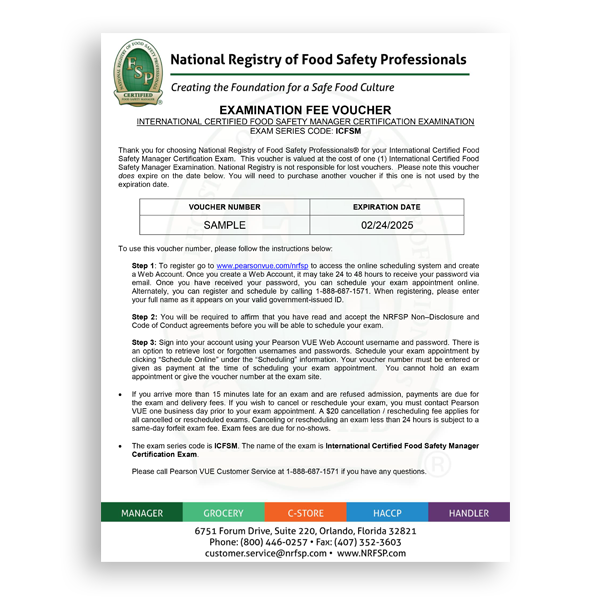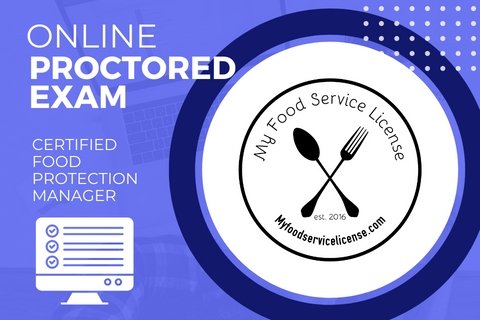Just How to Obtain Licensed as a ServSafe Manager and Make Sure Safe Practices
Just How to Obtain Licensed as a ServSafe Manager and Make Sure Safe Practices
Blog Article
Professional Training for Food Supervisor Accreditation Made Simple
The importance of food supervisor accreditation can not be understated, specifically in an era where food safety and security is critical. Expert training programs have evolved to enhance the certification procedure, providing crucial understanding and sensible skills essential for effective food monitoring. These programs cover crucial subjects, from foodborne disease avoidance to conformity with health and wellness guidelines. However, the real worth of this training extends past simple qualification; it has extensive ramifications for career improvement and public wellness. Understanding exactly how these components adjoin may expose chances that are often neglected.
Relevance of Food Supervisor Qualification
The relevance of Food Supervisor Qualification can not be overemphasized in today's food solution sector. This qualification symbolizes that food supervisors have the necessary understanding and skills to guarantee food safety, maintain health standards, and promote governing conformity. In an age where foodborne diseases can have severe consequences, the duty of a qualified food supervisor ends up being essential in protecting public health.
Food Supervisor Accreditation not only equips people with the knowledge to alleviate and identify food safety threats however also enhances the reputation of the facility. Customers are significantly critical; they seek guarantee that their dining experience is hygienic and secure. Accreditation offers as a mark of expertise that can draw in and retain consumers.
Additionally, regional jurisdictions and lots of states mandate that facilities utilize certified food supervisors to follow health and wellness regulations. This demand underscores the accreditation's value in avoiding prospective lawful ramifications and penalties. Additionally, a licensed food supervisor can lead staff training, promoting a society of safety and responsibility within the office. Buying Food Supervisor Qualification is an investment in high quality, safety and security, and the overall success of food service procedures.
Summary of Professional Training Programs
Professional training programs for food supervisor qualification are made to provide extensive education on food security methods, regulative compliance, and threat management. These programs intend to outfit food service experts with the expertise and abilities necessary to guarantee risk-free food handling and prep work in various settings, including restaurants, catering services, and institutional food operations.
Generally, professional training programs include both theoretical and practical elements, permitting participants to engage with real-world scenarios. The educational program usually includes important subjects such as foodborne diseases, proper food storage techniques, hygiene procedures, and employee training approaches. These programs are regularly updated to line up with the most recent industry standards and guidelines, ensuring that participants receive relevant and current info.
Numerous programs use adaptable delivery approaches, consisting of in-person classes, online courses, or a hybrid technique, catering to various understanding choices and routines. Upon successful completion, individuals typically receive accreditation, which is frequently acknowledged by neighborhood health divisions and regulative firms, boosting their profession prospects within the food service market. On the whole, specialist training programs play a critical function in promoting a culture of food safety and security and conformity amongst food supervisors and staff.
Key Subjects Covered in Training
Food safety is an essential emphasis in food supervisor accreditation training, encompassing a range of essential topics that make sure participants are well-equipped to manage food securely. One of the key subjects covered is the relevance of personal health, which consists of correct handwashing methods and the importance of maintaining sanitation in food preparation areas.
Furthermore, the training addresses foodborne illnesses, detailing the different pathogens that can pollute food and the signs and symptoms connected with these ailments. Participants find out regarding the problems that promote bacterial development, which is important for protecting against episodes.
Temperature control is an additional key additional resources subject, stressing the secure cooking, cooling, and storage space temperatures required to decrease risks. The training likewise covers cross-contamination avoidance approaches, ensuring that raw and prepared foods are dealt with properly to stay clear of hazardous communications.
In addition, food safety and security policies and standards, such as those established forth by the FDA and regional health divisions, are talked about to give an extensive understanding of conformity needs. Last but not least, efficient insect control measures are checked out to secure food facilities from invasions that can jeopardize security. Collectively, these subjects lay a solid structure for secure food administration techniques.
Advantages of Professional Training
Exactly how can skilled training improve food security methods within a facility? Professional training furnishes food managers with comprehensive understanding of food safety and security regulations, market standards, and finest practices. This foundational understanding is crucial for preserving a tidy and safe cooking environment, ultimately lowering the danger of foodborne diseases.
Moreover, specialist training promotes an aggressive strategy to food security by stressing safety nets and hazard analysis. Managers trained by market experts can properly determine possible threats and apply strategies to reduce them. This not only safeguards clients however likewise improves the establishment's track record and dependability.
Furthermore, professional training motivates a culture of continuous enhancement. Food supervisors who participate in ongoing education are better prepared to adjust to new laws and fads in the food solution market. This adaptability can lead to improved functional performance and expense savings.


Actions to Achieve Accreditation
Attaining accreditation in food monitoring requires a systematic technique that incorporates several crucial actions. First, individuals have to select a certified training program that supplies comprehensive coursework in food safety, administration, and hygiene principles. These programs usually give beneficial sources, consisting of research study materials and click site practice tests
Following, prospects ought to actively engage in the training sessions, whether on-line or in-person, to improve their understanding of vital topics such as foodborne illnesses, individual health, and proper food storage space strategies. Involvement in discussions and sensible workouts can even more reinforce understanding.

Once read this post here effectively ready, candidates can schedule and take the examination. Successful completion normally calls for achieving a particular passing rating, which shows a thorough grip of food safety and security requirements.
Conclusion
In summary, specialist training for food supervisor qualification plays an essential function in making sure food security and conformity with governing criteria. The organized programs give crucial knowledge and practical skills necessary for taking care of foodborne health problems and cleanliness procedures successfully. By assisting in availability and improving occupation prospects, these training campaigns add substantially to public health and wellness. Eventually, accomplishing food manager certification via specialist training not just raises individual competencies yet additionally promotes a much safer food environment for all.

Specialist training outfits food managers with comprehensive knowledge of food safety and security policies, market requirements, and finest methods.In recap, professional training for food manager qualification plays a crucial role in guaranteeing food security and compliance with regulatory standards (ServSafe Food Manager Certification). Inevitably, accomplishing food manager accreditation through expert training not only raises individual competencies but additionally cultivates a much safer food atmosphere for all
Report this page